Key takeaways:
- Licensing contracts are critical to understanding artist rights and can significantly impact distribution; always read the fine print.
- Effective licensing can enhance an artist’s career, providing validation and expanding visibility through strategic agreements.
- Successful negotiations require clarity, flexibility, and emotional intelligence; building rapport can transform transactions into meaningful partnerships.
- Preparation and thorough research are essential to avoid misunderstandings and ensure confidence in agreements.
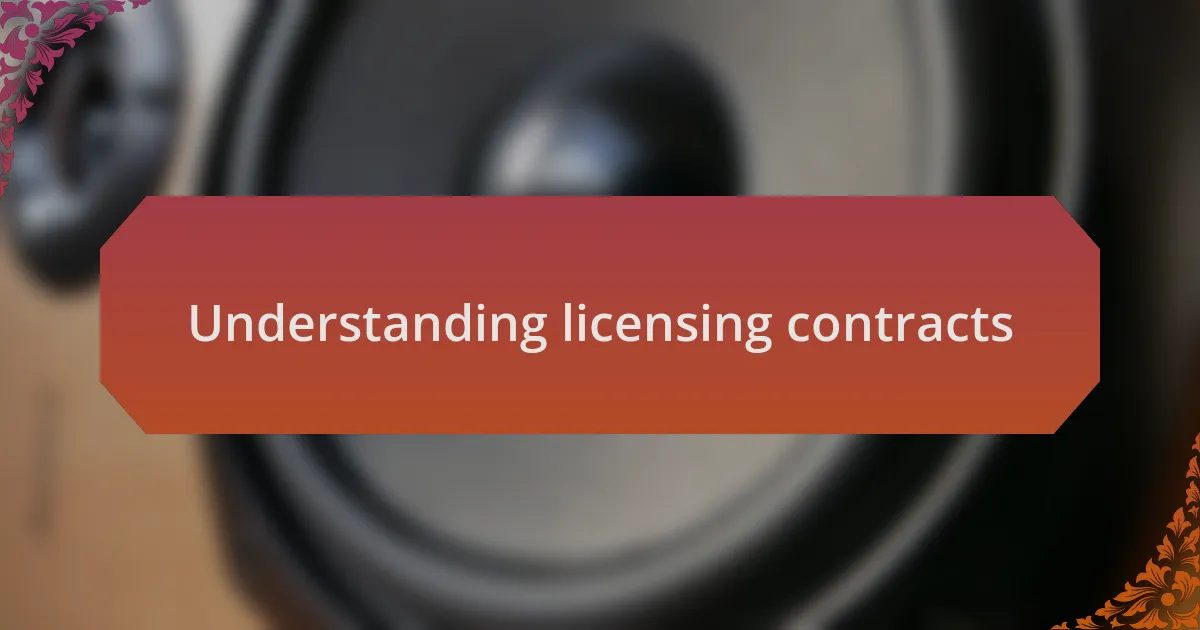
Understanding licensing contracts
Licensing contracts can feel overwhelming, especially when you’re first starting out as an independent label. I remember sitting down with my first contract, feeling both excited and anxious. Understanding every clause and nuance seemed like a daunting task, but I quickly realized that breaking it down into manageable parts made a world of difference.
It’s essential to grasp that a licensing contract is essentially an agreement where one party allows another to use their intellectual property, like music, for a specified period and under certain conditions. I had a moment where I misinterpreted a clause, thinking it wouldn’t affect me, only to find out later that it limited my distribution rights significantly. Imagine the stress of having to renegotiate—always read the fine print!
Have you ever wondered how these agreements impact your relationship with artists? In my experience, clear communication about what each clause means fosters trust and collaboration. When I started explaining the implications of each section to the artists I worked with, it made them feel more included and empowered in the process, rather than sidelined. This approach not only strengthens partnerships but also enhances the overall success of our projects.
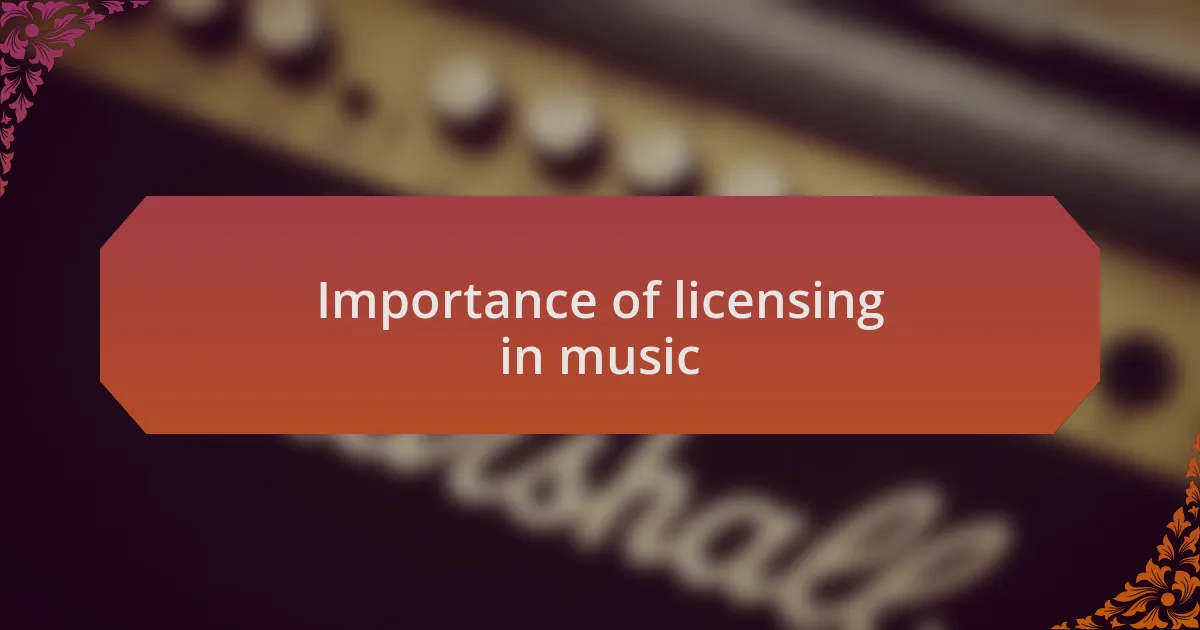
Importance of licensing in music
Licensing in music is crucial because it defines how artists can share and monetize their work. I learned this firsthand during an album release when a licensing oversight turned into a financial headache. That experience taught me the importance of establishing clear licensing terms early on to avoid any unexpected roadblocks down the line.
When you consider how deeply music is intertwined with various media—like film, ads, and social platforms—you realize that effective licensing can open doors. There was a moment at my label when I successfully negotiated a sync deal for one of our artists’ tracks in a popular series. The artist and I were both ecstatic, realizing that the right license not only showcased their talent but also expanded their audience exponentially.
Have you ever thought about how licensing can influence an artist’s career trajectory? For me, seeing a song licensed for national television marked a turning point. It wasn’t just about royalties; it was about validation and recognition, both for the artist and the label. That moment underscored how essential strong licensing practices are to not just protect rights but to elevate an artist’s visibility in the industry.
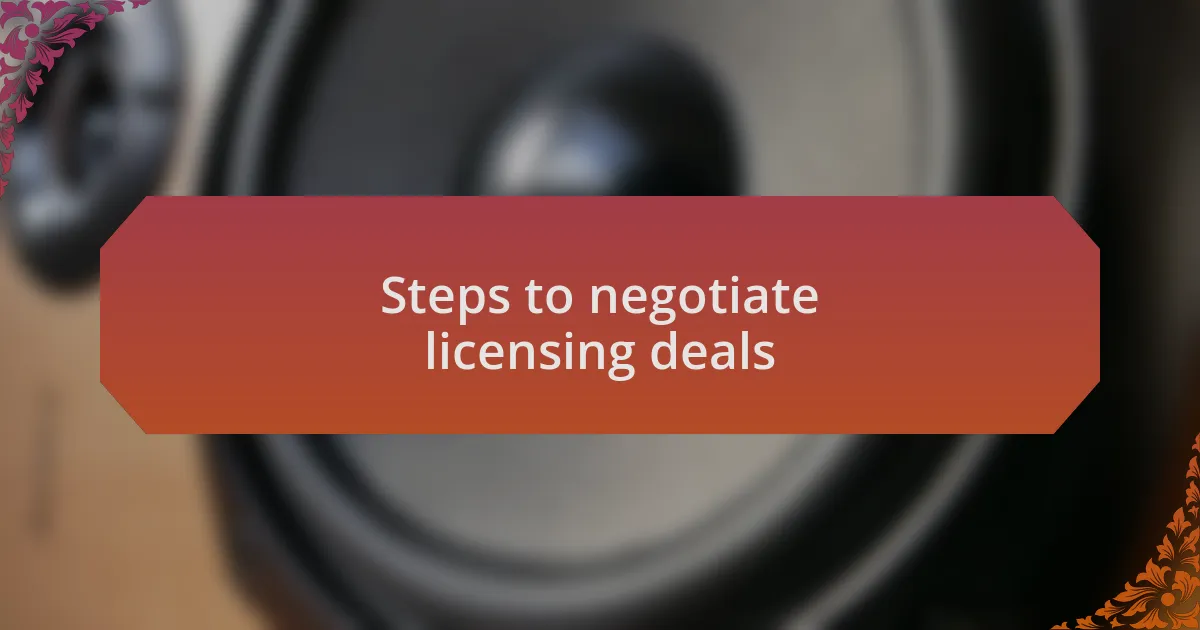
Steps to negotiate licensing deals
Negotiating licensing deals starts with understanding the specific needs of both parties involved. I remember a time when I collaborated with a filmmaker who had a tight budget but a passionate vision for a project. Taking the time to listen to his goals helped me tailor the licensing terms in a way that not only met his financial constraints but also maximized exposure for the artist. Did I ever think I’d walk away feeling like a matchmaker for creativity? Absolutely!
Next, I found that drafting a clear initial proposal sets the tone for negotiation. When I prepared a proposal for a commercial campaign that featured one of our rising artists, I made sure to highlight how the content would resonate with the brand’s audience while also benefiting the artist. This approach not only fueled the conversation but also demonstrated my commitment to both parties’ success. Have you ever prepared something with a dual focus, like you’re juggling two friends’ needs? It’s a balancing act that pays off.
Finally, never underestimate the power of flexibility during negotiations. In my experience, there’s often room to maneuver, especially when both sides are committed to a win-win outcome. I once had an artist willing to lower the upfront fee for a more favorable royalty share. This twist not only secured the deal but established a lasting partnership. Isn’t it fascinating how being open to adjustments can turn a straightforward transaction into a fruitful collaboration?
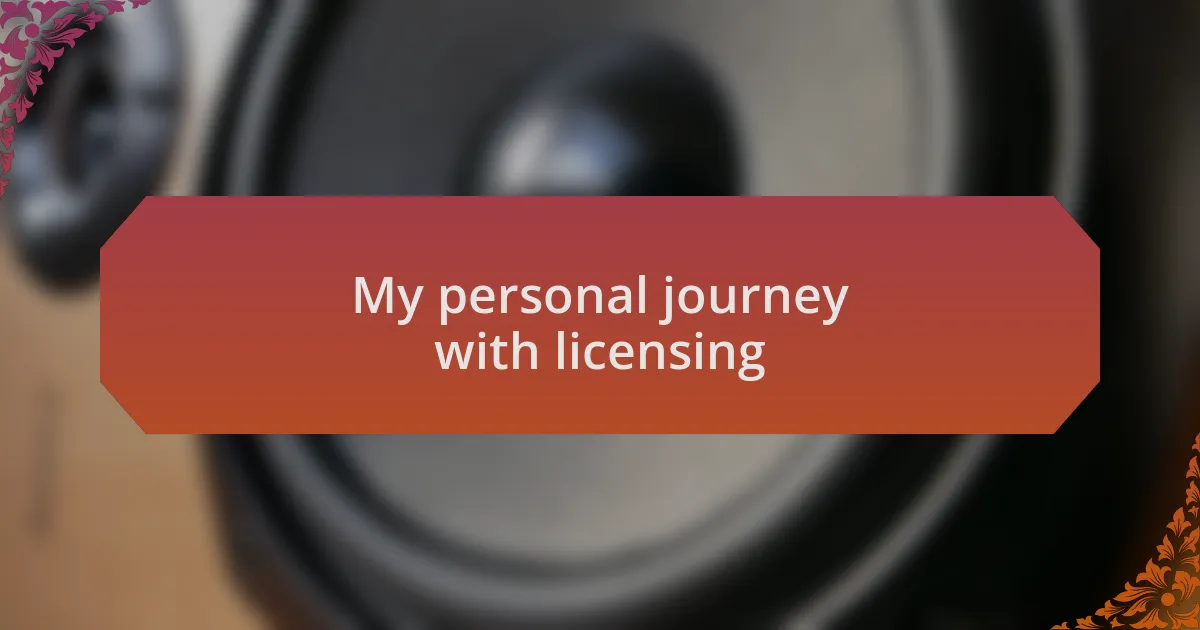
My personal journey with licensing
My personal journey with licensing has been a blend of excitement and learning. I vividly recall my first licensing deal, which felt like stepping into uncharted territory. I was nervous but eager, and as I navigated the discussions, I realized that patience and clarity were my best friends. How could I have imagined that what felt like a daunting challenge would evolve into an invaluable lesson in communication?
Through the years, I’ve gathered stories that shaped my approach. There was an instance when I worked with a well-known artist who initially had reservations about licensing their hit song. Listening to their concerns allowed me to address specific issues, leading to a breakthrough where we created a unique package that preserved their creative integrity while increasing visibility. It’s fascinating how trust can transform initial reluctance into enthusiasm.
Licensing isn’t just about contracts; it’s about building relationships. I remember a late-night phone call with a partner where we hashed out the details of a complex deal. As we discussed each point, the conversation flowed easily, almost like a collaborative jam session. Moments like these remind me that behind every agreement lies a story of shared ambitions. Isn’t it remarkable how personal connections can turn what seems like a transaction into a meaningful partnership?
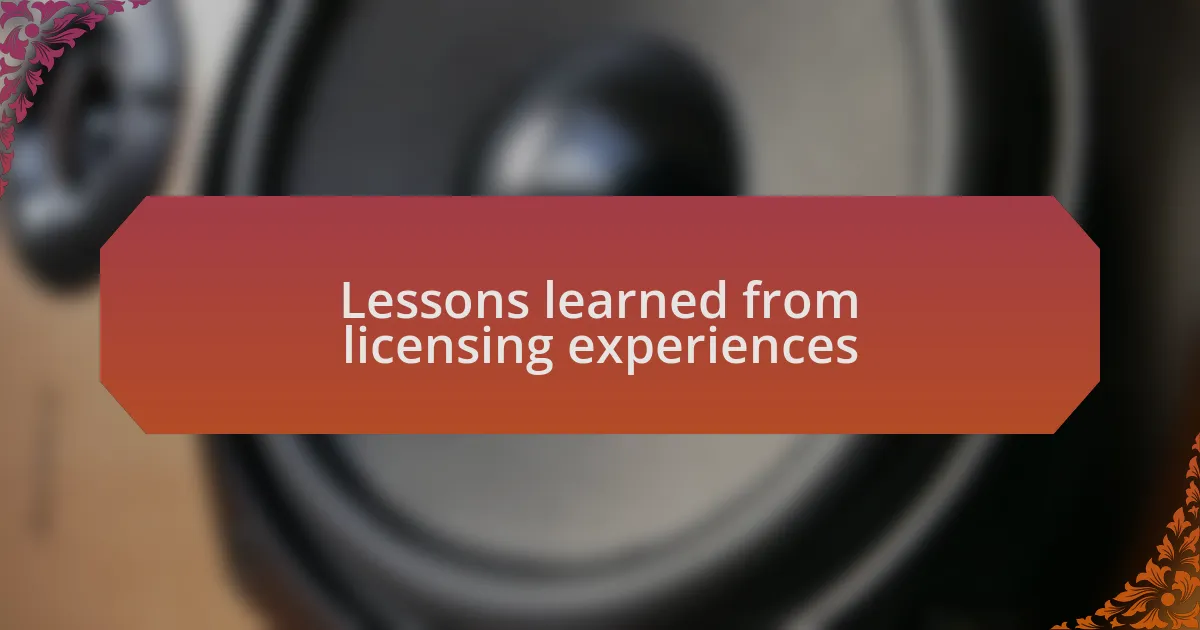
Lessons learned from licensing experiences
One of the most important lessons I’ve learned from my licensing experiences is the value of thorough preparation. I remember a project where I didn’t fully understand the intricacies of a particular licensing right, leading to a last-minute scramble that could have been avoided. It taught me that taking the time to research every detail not only saves time but also ensures that everyone involved enters the agreement with confidence. How much smoother could my process have been if I had prioritized that preparation from the start?
Another significant insight is the importance of flexibility in negotiations. In one memorable deal, I encountered an artist whose vision conflicted with the licensing terms I proposed. Instead of standing my ground, I pivoted and offered alternatives that aligned more closely with their goals. This adaptability not only salvaged the contract but helped build a newfound respect between us. Isn’t it incredible how compromise can pave the way for collaboration?
Lastly, I’ve found that emotional intelligence plays a pivotal role in licensing discussions. During a particularly tense negotiation, I noticed that the other party was frustrated and hesitant to move forward. By taking a moment to empathize and acknowledge their feelings, I not only diffused the tension but also opened the door to a more constructive dialogue. Have you ever considered how much a simple gesture of understanding can change the dynamics of a professional relationship? It’s often the key to transforming potential conflicts into powerful partnerships.
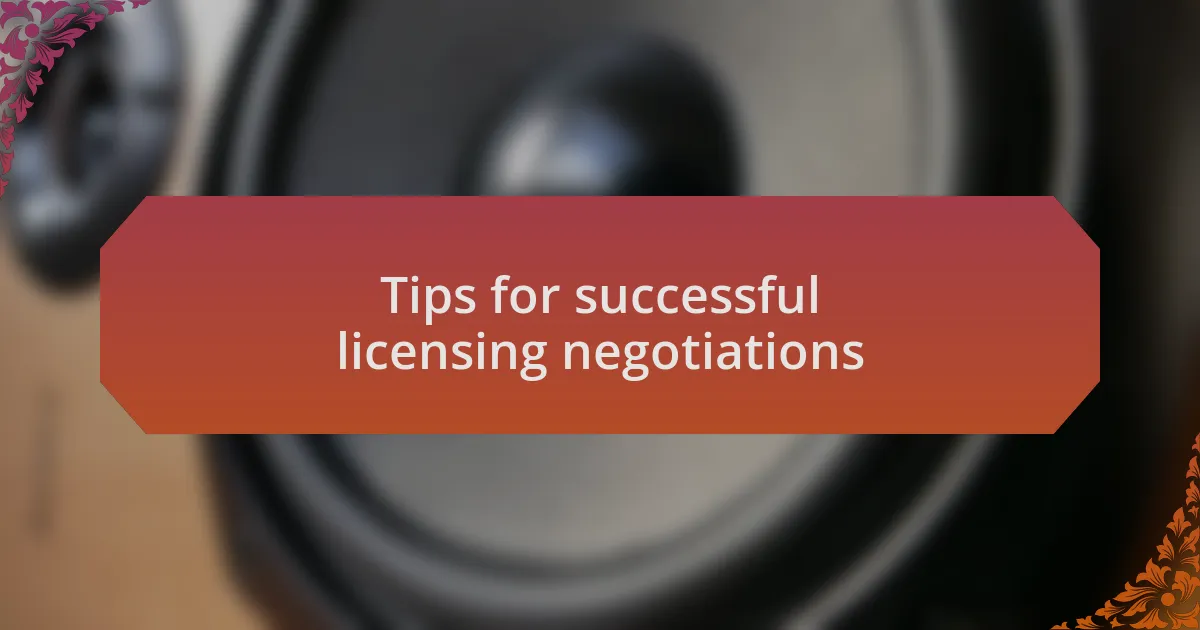
Tips for successful licensing negotiations
When it comes to successful licensing negotiations, clarity is crucial. I recall one situation where ambiguity in the contract wording led to misunderstandings down the line. It felt frustrating trying to clarify intentions after the fact. That’s why I now emphasize the importance of transparent communication from the very beginning. Are you clearly articulating your expectations? It can save a lot of heartache later.
Another tip I’ve found beneficial is to build personal rapport. In one instance, I took the time to genuinely connect with the other party over shared interests before diving into terms. That small investment of time transformed our negotiation into a friendly discussion rather than a transactional exchange. Isn’t it amazing how a little human connection can change the atmosphere?
Lastly, I’ve learned to always leave room for creativity in negotiations. I remember a deal where my initial suggestions were met with hesitation, but we ended up brainstorming and discovered an innovative approach that satisfied both sides. It turned a potentially stagnant conversation into a collaborative effort. So, how often do you explore outside-the-box solutions in your discussions? Embracing creativity can unlock opportunities you may not have envisioned at first.